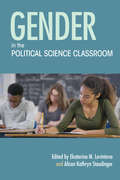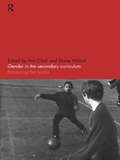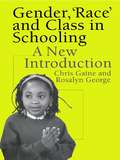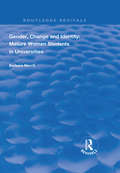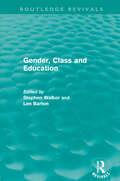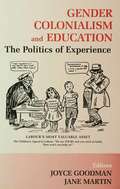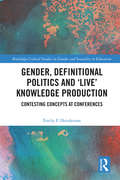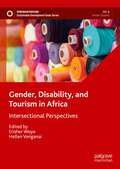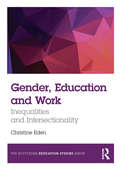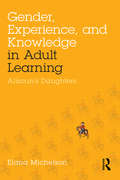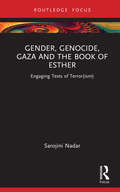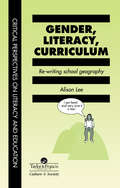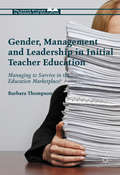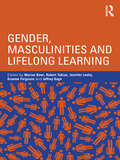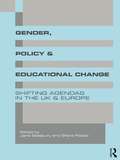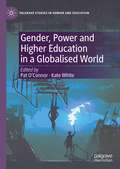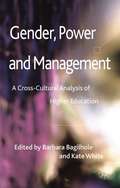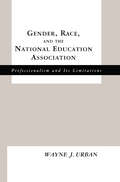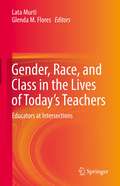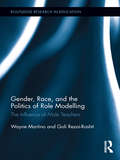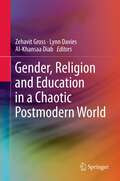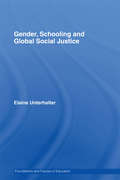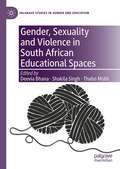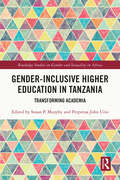- Table View
- List View
Gender in the Political Science Classroom (Scholarship of Teaching and Learning)
by Ekaterina M. Levintova Alison Kathryn StaudingerGender in the Political Science Classroom looks at the roles gender plays in teaching and learning in the traditionally male-dominated field of political science. The contributors to this collection bring a new perspective to investigations of gender issues in the political behavior literature and feminist pedagogy by uniting them with the Scholarship of Teaching and Learning (SoTL). The volume offers a balance between the theoretical and the practical, and includes discussions of issues such as curriculum, class participation, service learning, doctoral dissertations, and professional placements. The contributors reveal the discipline of political science as a source of continuing gender-based inequities, but also as a potential site for transformative pedagogy and partnerships that are mindful of gender. While the contributors focus on the discipline of political science, their findings about gender in higher education are relevant to SoTL practitioners, other social-science disciplines, and the academy at large.
Gender in the Secondary Curriculum: Balancing the Books
by Elaine Millard Ann ClarkThe 'gender gap' in GCSE results continues to be of prime concern, and there is now a real need for knowledge about how teachers can address this gap. In this volume, a team of contributors considers the gender issues particular to each subject of the secondary curriculum. They discuss effective strategies supported by their research and practice, and offer some ways forward for teachers. The book begins with an overview of contemporary social and cultural approaches to schooling and gender, focusing particularly on the contribution of feminist scholars to the debate. It further examines key aspects of the secondary school curriculum and the implications for learners of their gendered identity. The final section moves beyond the classroom to discuss the influence of current theoretical perspectives on the complex inter-relationship between the curriculum and young peoples' gendered identities, and its implications for their future development. In discussing the character of boys' and girls' achievements in a range of school subjects, the authors seek to 'balance the books' by debating the different, if sometimes competing needs of both boys and girls.
Gender, 'Race' and Class in Schooling: A New Introduction
by Chris Gaine Rosalyn George Dr Chris Gaine Ms Rosalyn GeorgeWith education and social inequalities under scrutiny, this timely book provides an up-to-date summary of research into the key issues, as well as practical strategies for educators, including strategies for staff development, working with children and school policy. The facts have changed significantly, and much received wisdom cannot be relied upon: girls' performance is rising faster than boys and surpasses them in almost all respects up to the age of 18; unequal opportunity faced by those of different race is becoming more fractured along class, gender, ethnic and religious lines; class divisions are increased with the reintroduction of selection and has become a matter of concern for government and school policy makers. This title makes good the lack of literature on inequality, and brings teachers, and those training to be teachers, the latest information.
Gender, Change and Identity: Mature Women Students in Universities (Routledge Revivals)
by Barbara MerrillFirst published in 1999, this volume centres on a case study which looks at the experiences of non-traditional adult women students in universities, from the perspective of the actors. The interaction of structure and agency and the significance of macro and micro levels in shaping the behaviour, attitudes and experiences of women adult students are examined by drawing on three perspectives: feminism, Marxism and interactionism. An underlying question is to what extent did studying change the way participants perceived themselves as women? It relates life histories to their student career as individuals and collectively as subcultural groups. It also breaks new ground by including a sample of male adult students in order to compare and clarify gender issues. It also uses macro and micro sociological theories as a tool for understanding the experiences of women at university and the relationship between their public and private lives. The book concludes that studying for a degree represented an active decision to take greater control, to break free from gender and class restraints, and to transform individual lives. The study aims to clarify and reassert the radical individual traditions within sociology, feminism and adult education.
Gender, Class and Education (Routledge Revivals)
by Stephen Walker Len BartonFirst published in 1983, Gender, Class and Education is a collection of papers that formed presentations at the Westhill Sociology of Education Conference in January 1982, and is the fifth such collection to emerge from the annual conference. The conference theme, ‘Race, Class and Gender’, was not only chosen because of its topicality, but also to provide a framework for debate between educational researchers and teachers. The papers focus on the reproduction of gender relations through education and provide important insights into how this process works, how it is resisted in schools and colleges, and the possibilities for radical intervention. This volume includes three teaching bibliographies on gender and education which were not presented at the conference, but were compiled specially for the book.
Gender, Colonialism and Education: An International Perspective (Woburn Education Series)
by Jane Martin Joyce GoodmanAn examination of the ways in which gender intersects with informal and formal education in England, Germany, Indonesia, South Africa, USA and the Netherlands. The book looks at various issues including: citizenship; authority; colonialism and education; and the construction of national identities.
Gender, Definitional Politics and 'Live' Knowledge Production: Contesting Concepts at Conferences (Routledge Critical Studies in Gender and Sexuality in Education)
by Emily F. HendersonWaking up to the reactivity of concepts, to their myriad possibilities for signification, to the range and strength of affective responses they provoke, can happen at any time, in any place. Conceptual contestations shake up the comfortably consolidated foundations of sociological knowledge production, but they also have consequences for the ways in which lives are understood, researched and legislated for. This book is dedicated to exploring the definitional politics which surround the concept of gender in ‘live’ knowledge production. While conferences remain an under-researched phenomenon, this volume places conference knowledge production under the spotlight; conferences, in particular national women’s studies association conferences in the UK, the US and India, are explored as sites where definitional politics play out. The cumulative theorisation of ‘live’ conceptual knowledge production that is developed throughout the book draws on established constructs such as performativity, citationality, intersectionality, materiality and events, but works with them in combination in a new, unique way. The book as a whole calls for more attention to be paid to conceptual knowledge production, so as to make more space for potentially transformative conceptual change.
Gender, Disability, and Tourism in Africa: Intersectional Perspectives (Sustainable Development Goals Series)
by Erisher Woyo Hellen VenganaiThis book explores the intersection of gender and disability in the context of tourism. In part, the book foregrounds feminist theorising of intersectionality by examining how gender can overlap with other social identities to contribute to more systemic oppression, domination, discrimination, and marginalisation of certain categories of people. Our point of departure is that disability does not operate in isolation as it is constituted and experienced within an already gendered social and tourism environment. With substantial research on the intersection of gender and tourism on the one hand, and the intersection of disability and tourism on the other hand, the interconnectedness of gender and disability and the implications this has on tourism policy and practice remains understudied. Thus, the book provides a critical lens that helps unpack underlying assumptions about gender and disability while questioning the dominant ideas about gender and disability reproduced through tourism policies and institutional practices in an African context. This book will be of interest to scholars and researchers in Gender Studies, Disability Studies, and Tourism Studies, particularly those with a research interest in Africa.
Gender, Education and Work: Inequalities and Intersectionality (The Routledge Education Studies Series)
by Christine EdenGirls outperform boys in educational achievement, yet women in work are less well paid, are underrepresented in positions of power and carry a disproportionate burden of care and childcare. Gender, Education and Work analyses and interprets the latest data and research in the field to offer detailed historical and sociological explanations for this continuing inequity, exploring different dimensions of inequality and how they intersect. With discussion questions and selected further reading to support reflection on your own understanding and assumptions, it covers key topics: Historical approaches to the education of girls and women Key theories and debates Patterns of achievement and intersectionality Attainment gaps and socio-economic status Ethnicity and attainment gaps Gender in the classroom and gender identity in schools Patterns of employment and the nature of work The gender pay gap Women’s experience of work Gender, Education and Work provides the arguments together with the historical evidence and research data required by serious education studies and sociology students engaged in the analysis of this urgent and complex topic.
Gender, Experience, and Knowledge in Adult Learning: Alisoun’s Daughters
by Elana MichelsonIn this wide-ranging book, Elana Michelson invites us to revisit basic understandings of the `experiential learner’. How does experience come to be seen as the basis of knowledge? How do gender, class, and race enter into the ways in which knowledge is valued? What political and cultural belief systems underlie such practices as the assessment of prior learning and the writing of life narratives? Drawing on a range of disciplines, from feminist theory and the politics of knowledge to literary criticism, Michelson argues that particular understandings of `experiential learning’ have been central to modern Western cultures and the power relationships that underlie them. Presented in four parts, this challenging and lively book asks educators of adults to think in new ways about their assumptions, theories, and practices: Part I provides readers with a short history of the notion of experiential learning. Part II brings the insights and concerns of feminist theory to bear on mainstream theories of experiential learning. Part III examines the assessment of prior experiential learning for academic credit and/or professional credentials. Part IV addresses a second pedagogical practice that is ubiquitous in adult learning, namely, the assigning of life narratives. Gender, Experience, and Knowledge in Adult Learning will be of value to scholars and graduate students exploring adult and experiential learning, as well as academics wishing to introduce students to a broad range of feminist, critical-race, materialist and postmodernist thinking in the field.
Gender, Genocide, Gaza and the Book of Esther: Engaging Texts of Terror(ism) (Rape Culture, Religion and the Bible)
by Sarojini NadarGender, Genocide, Gaza and the Book of Esther bridges the gap between gendered and geopolitical analyses by interrogating both the sexual and ethnic violence embedded in the Book of Esther. While much scholarship has examined the potential genocide of the Jews in the narrative, far less attention has been paid to the Persian “retaliation genocide.” Framed within decolonial feminist perspectives, this book shifts between the harem—the royal institution where women were sequestered for the king’s use—and herem, the practice of divinely sanctioned warfare that justifies the extermination of an enemy. Rather than operating as discrete forms of violence, the book argues that the harem and the herem are co-constitutive, revealing how gendered and ethnic domination function in tandem. Through a combination of narrative inquiry, inter-textual readings, critical discourse analysis, and theological assessments of both the biblical text and its contemporary reception, Gender, Genocide, Gaza and the Book of Esther invites interpreters to consider the larger frameworks of ethnicity and racialization within which hermeneutics of sexual violence take place. A close literary reading of Esther is paired with an analysis of its contemporary geopolitical appropriations, particularly its use in Christian Zionist rhetoric. The explicit invocation of the Amalekite extermination trope by Israel’s prime minister in October 2023 to justify attacks on Gaza, underscores the enduring political afterlives of texts of terror. This book contends that a feminist reading of Esther cannot limit itself to an analysis of sexual violence but must extend its critique intersectionally, engaging with the broader necropolitical economies that structure both ancient and modern deployments of biblical violence.
Gender, Literacy, Curriculum: Rewriting School Geography (Critical Perspectives On Literacy And Education Ser.)
by Alison LeeFirst Published in 1996. Routledge is an imprint of Taylor & Francis, an informa company.
Gender, Management and Leadership in Initial Teacher Education
by Barbara ThompsonThis book highlights the difficulties that women working as managers and leaders in initial teacher education face. Teacher education is at the forefront of education reforms and yet little is known about the professional lives of those who work within it. Whereas many women are moving into positions of authority in teacher training, some existing women managers are being marginalized within new internally differentiated layers of managerial structures. Yet other female managers, mainly new appointees, seem to endorse the discourses associated with new managerialist practices. Simultaneously some women who manage in teacher training are engaged in a struggle for survival individually and professionally. In the main, men seem to be missing from authority positions and will conclude that, in the current climate, the management of teacher training is 'no job for a man'.
Gender, Management and Leadership in Initial Teacher Education: Managing to Survive in the Education Marketplace? (Palgrave Studies in Gender and Education)
by Barbara ThompsonThis book highlights the difficulties that women working as managers and leaders in initial teacher education face. Teacher education is at the forefront of education reforms and yet little is known about the professional lives of those who work within it. Whereas many women are moving into positions of authority in teacher training, some existing women managers are being marginalized within new internally differentiated layers of managerial structures. Yet other female managers, mainly new appointees, seem to endorse the discourses associated with new managerialist practices. Simultaneously some women who manage in teacher training are engaged in a struggle for survival individually and professionally. In the main, men seem to be missing from authority positions and will conclude that, in the current climate, the management of teacher training is ‘no job for a man’.
Gender, Masculinities and Lifelong Learning
by Marion Bowl Robert Tobias Jennifer Leahy Graeme Ferguson Jeffrey GageGender, Masculinities and Lifelong Learning reflects on current debates and discourses around gender and education, in which some academics, practitioners and policy-makers have referred to a crisis of masculinity. This book explores questions such as: Are men under-represented in education? Are women outstripping men in terms of achievement? What evidence supports the view that men are becoming educationally disadvantaged? Drawing on research from a number of countries, including the UK, Australia, New Zealand and Canada, the contributors' discuss a range of issues which intersect with gender to impact on education, including structural factors such as class, ethnicity and age as well as colonisation and migration. The book provides evidence and argument to illuminate contemporary debates about the involvement of men and women in education, including: The impact of colonisation on the gendering of education and lifelong learning International surveys on men, women and educational participation Gender, masculinities and migrants’ learning experiences Boys-only classes as a response to ‘the problem of underachieving boys’ Men’s perspectives on learning to become parents Community learning, gender and public policy Older men’s perspectives on (re-)entering post-compulsory education The book goes on to suggest the implications for practice, research and policy. Importantly, it critically addresses some of the taken-for-granted beliefs about men and their engagement in lifelong learning, presenting new evidence to demonstrate the complexity of gender and education today. With these complexities in mind, the authors provide a framework for developing further understanding of the issues involved with gender and lifelong learning. Gender, Masculinities and Lifelong Learning will be of interest to any practitioner open to fresh ideas and approaches in teaching and programming connected with gender and education.
Gender, Policy and Educational Change: Shifting Agendas in the UK and Europe
by Sheila Riddell Jane SalisburyGender equality has been a major educational theme for the past two decades and has become interwoven with other policy themes, including those of marketisation and managerialism. Contributors to this strong collection are key researchers in their fields and seek to address the following questions:* What patterns are discernible in the educational attainment of girls and boys over the past two decades?* To what extent are changes attributable to gender equality policies?* What form have gender equality policies taken in different parts of the UK?* What has been the impact of European equality policies?* How have gender equality policies been experienced by particular groups including pupils from ethnic minority and working-class backgrounds?This book aims to take an overall look at how significant have been the changes in experiences, aspirations and culture of girls and boys and male and female teachers. It explores how attempts to improve equal opportunities in education have fared and examines the tensions and contradications in recent policies.
Gender, Power and Higher Education in a Globalised World (Palgrave Studies in Gender and Education)
by Kate White Pat O’ConnorThis book examines persistent gender inequality in higher education, and asks what is preventing change from occurring. The editors and contributors argue that organizational resistance to gender equality is the key explanation; reflected in the endorsement of discourses such as excellence, choice, distorted intersectionality, revitalized biological essentialism and gender neutrality. These discourses implicitly and explicitly depict the status quo as appropriate, reasonable and fair: ultimately impeding efforts and attempts to promote gender equality. Drawing on research from around the world, this book explores the limits and possibilities of challenging these harmful discourses, focusing on the state and universities themselves as levers for change. It stresses the importance of institutional transformation, the vital contribution of feminist activists and the importance of women’s deceptively ‘small victories’ in the academy.
Gender, Power and Management
by Kate White Barbara BagilholeWomen are now part of senior management in higher education (HE) to varying degrees in most countries and actively contribute to the vision and strategic direction of universities. This book attempts to analyse their impact and potential impact on both organisational growth and culture
Gender, Race and the National Education Association: Professionalism and its Limitations (Studies in the History of Education)
by Wayne J. UrbanUrban presents the NEA in its historical context, turning a fair and clear eye on this powerful and controversial organization, and using this context to both criticize and commend. The culmination of a three decade long study, this unique volume presents an unusually thorough and much needed holistic view of the NEA.
Gender, Race, and Class in the Lives of Today’s Teachers: Educators at Intersections
by Glenda M. Flores Lata MurtiThis volume explores the professional experiences of a vast array of educators through a series of research essays that focus on the interplay of gender, race, class, and sexualities as well as how these dynamics influence the educators’ teaching. The volume illuminates this interplay not only in traditional classroom settings, but also in non-traditional contexts such as prisons and juvenile detention facilities, family education, dual-language immersion programs, early childhood education, and higher education, including teacher training programs. The concluding chapter, written by the editors, provides general recommendations for recruiting and retaining a more diverse teacher workforce worldwide. From autoethnographies to pláticas, testimonios and in-depth interviews, this qualitatively rich volume offers powerful and timely insights about the experiences of teachers who are too often overlooked. Gilda L. Ochoa, Professor of Chicana/o Latina/o Studies This illuminating book centers educators’ intersectional subjectivities and lived experiences, bringing to life the radical possibilities of transformative education. It is a much needed resource for anyone invested in understanding and advancing education as a catalyst for equity and social justice. Lorena Garcia, Associate Professor of Sociology & Latin American and Latino Studies
Gender, Race, and the Politics of Role Modelling: The Influence of Male Teachers (Routledge Research in Education)
by Wayne Martino Goli Rezai-RashtiThis book provides an illuminating account of teachers’ own reflections on their experiences of teaching in urban schools. It was conceived as a direct response to policy-related and media-generated concerns about male teacher shortage and offers a critique of the call for more male role models in elementary schools to address important issues regarding gender, race and the politics of representation. By including the perspectives of minority teachers and students, and by drawing on feminist, queer and anti-racist frameworks, this book rejects the familiar tendency to resort to role modelling as a basis for explaining or addressing boys’ disaffection with schooling. Indeed, the authors argue, on the basis of their research in urban schools in Canada and Australia, that educational policy concerned with male teacher shortage and the plight of disadvantaged minority boys would benefit from engaging with analytic perspectives and empirical literature that takes readers beyond hegemonic discourses of role modelling. A compelling case is presented for the need to disarticulate discourses about role modelling from a politics of representation that is committed to addressing the reality of the impact of racial and structural inequalities on both minority teachers and students’ participation in the education system. The book also provides insight into the persistence of gender inequality as it relates to the status of elementary school teaching as women’s work.
Gender, Religion and Education in a Chaotic Postmodern World
by Lynn Davies Al-Khansaa Diab Zehavit GrossThe immense changes that the world is undergoing in terms of globalization and migration of peoples have had a profound effect on cultures and identities. The question is whether this means shifts in religious identities for women and men in different contexts, whether such shifts are seen as beneficial, negative or insufficient, or whether social change actually means new conservatisms or even fundamentalisms. Surrounding these questions is the role of education is in any change or new contradiction. This unique book enhances an interdisciplinary discourse about the complex intersections between gender, religion and education in the contemporary world. Literature in the social sciences and humanities have expanded our understanding of women's involvement in almost every aspect of life, yet the combined religious/educational aspect is still an under-studied and often under-theorized field of research. How people experience their religious identity in a new context or country is also a theme now needing more complex attention. Questions of the body, visibility and invisibility are receiving new treatments. This book fills these gaps. The book provides a strong comparative perspective, with 15 countries or contexts represented. The context of education and learning covers schools, higher education, non-formal education, religious institutions, adult literacy, curriculum and textbooks. Overall, the book reveals a great complexity and often contradiction in modern negotiations of religion and secularism by girls and boys, women and men, and a range of possibilities for change. It provides a theoretical and practical resource for researchers, religious and educational institutions, policy makers and teachers.
Gender, Schooling and Global Social Justice (Foundations and Futures of Education)
by Elaine UnterhalterTimely and original, this book examines gender equality in schooling as an aspiration of global social justice. With nearly one billion people having little or no schooling and women and girls comprising nearly two-thirds of this total, this book analyses the historical, sociological, political and philosophical issues involved as well as exploring actions taken by governments, Inter-Government Organisations, NGOs and women’s groups since 1990 to combat this injustice. Written by a recognised expert in this field, the book is organised clearly into three parts: the first provides a background to the history of the provision of schooling for girls worldwide since 1945 and locates the challenges of gender inequality in education the second examines different views as to why questions of gender and schooling should be addressed globally, contrasting arguments based on human capital theory, rights and capabilities the third analyses how governments, Inter-Government Organisations and NGOs have put policy into practice. Addressing the urgent global challenges in gender and schooling, this book calls for a new connected approach in policy and practice. It is essential reading for all those interested in education, along with developmental studies, sociology, politics and women’s studies.
Gender, Sexuality and Violence in South African Educational Spaces (Palgrave Studies in Gender and Education)
by Deevia Bhana Thabo Msibi Shakila SinghThe book focuses on the ways in which gendered and sexualised systems of power are produced in educational settings that are framed by broader social and cultural processes, both of which shape and are shaped by children and young people as they interact with each other. All these nuanced features of gender and sexuality are vital if we are to understand inequalities and violence, and fundamental to our three-ply yarn approach in this book. Focusing on the South African context, but with international relevance, the authors adopt the metaphor of the three-ply yarn (Jordan-Young, 2010): these being the cross-cutting themes of gender, sexuality and violence. Subsequently, the book illustrates the intimate ties that bind gender and sexuality with the social and cultural dimensions of violence, as experienced in educational settings.
Gender-Inclusive Higher Education in Tanzania: Transforming Academia (Routledge Studies on Gender and Sexuality in Africa)
by Susan P. Murphy Perpetua John UrioWhilst there is an extensive body of research exploring the barriers to gender equality and female empowerment in high-income states, there are far fewer systematic analyses within lower-income settings. This book draws on extensive empirical data to analyse gender mainstreaming and gender transformative actions in Tanzanian higher education.The book maps the practical landscape of gender mainstreaming across 14 universities in Tanzania, and the theoretical landscape of African theories of masculinities and femininities underpinning educational institutions and practices. It then assesses the Gender Awareness and Transformation through Education project, which was designed to support the development of gender expertise and capacities in research and education at one specific institution, across both its administrative and academic units. Current and future academics at Dar es Salaam University College of Education were trained in gender-based research and education, and a strategic plan was developed to guide in the establishment of a Gender Research Centre that will provide gender expertise in research and teaching to the College; and, over time, to other HEIs nationally and regionally. By bringing together real-world insights from action-based research, the book demonstrates the impact of real-time social change and gender transformation, with implications both for Tanzania and beyond.Bringing novel empirical insights and policy recommendations, this book will be of interest to researchers and policy makers across the fields of gender studies, education, and African studies.
